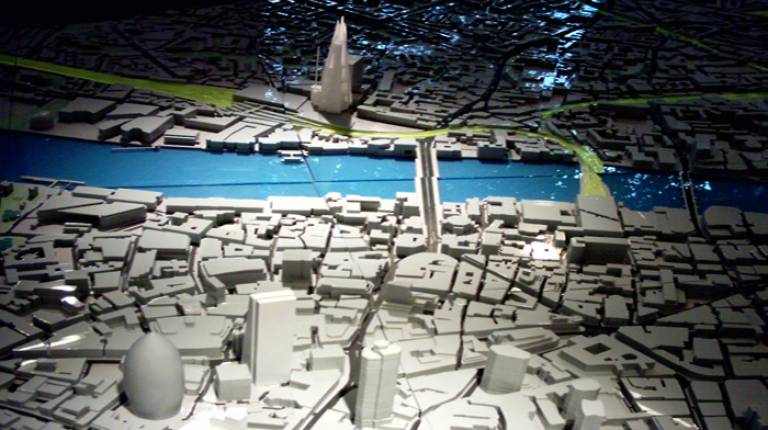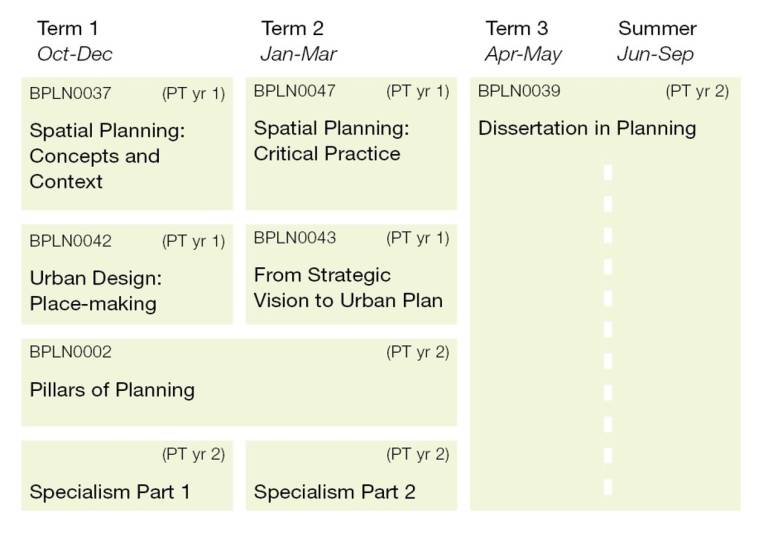The Spatial Planning MSc looks at how people, places and the environment interact and change in the management of space, and the ways this might be influenced.

About the course
Spatial planning is the management of space and development to create places that meet the needs of society, the economy and the environment. In response, the Spatial Planning MSc looks at how people, places and the environment interact and change, and the ways this might be influenced. The focus of our course is on UK practices and how these are considered within a European and global context, and approached through critical analysis and evaluation.
Why choose to study spatial planning at The Bartlett?
We offer:
- A course that draws on UCL's position as a leading research-led university.
- Opportunities for you to acquire a broad range of skills and knowledge, while also working towards a specialisation.
- A principle- and theory-driven course that provides both conceptual understanding of theories and the practical skills needed to tackle real world problems.
Who should apply?
We welcome graduates who wish to make a career in planning, related fields (such as housing, urban regeneration, transport planning or urban design), or teaching and/or research.
Course structure
The Spatial Planning MSc comprises 120 credits of taught modules and 60 credits of dissertation. The course runs over a year if completed full-time, with most classes timetabled in the first and second terms. Our research support module runs in the third term, which is scheduled to coincide with the early stages of the production of an MSc dissertation.
The following diagram illustrates the structure of the Spatial Planning MSc completed on a one-year full-time basis:

Field trips
Our course also includes a residential field trip during which themes relevant to the course are explored in different place contexts. This is an opportunity for our students to consider built environment issues in real world settings and network as a course community. The cost of travel and accommodation for the field trip are covered by UCL although students will need to cover meals and other personal expenses.
Flexible study
We also offer our students the opportunity to study flexibly, in which case students typically complete modules marked 'PT 1' (for part-time 1) in the course structure diagram before moving onto modules marked 'PT 2' (for part-time 2). Students studying flexibly have between two and five years to complete the course.
For students studying part-time, we are usually able to timetable classes so that it is possible to have to attend the university only one day per week during the three teaching terms. This enables our students to complete the course on a ‘day release’ basis from their employment, although students will also be required to study further in their own time.
- Read more about our core modules
- Spatial planning: Concepts and context (15 credits)
- Urban design: Place making (15 credits)
- From strategic vision to urban plan (15 credits)
- Pillars of planning (30 credits)
- Spatial planning: Critical practice (15 credits)
- Dissertation in plannin (60 credits)
- Read more about our topics to help you specialise through your studies
Students of the Spatial Planning MSc must must select two linked specialist modules to fulfil the requirements of RTPI accreditation. Our specialism topics at The Bartlett School of Planning include:
Infrastructure Planning:
This specialism consists of two modules addressing the question 'what constitutes a successful infrastructure project, programme or plan'. The first module 'Infrastructures as Agents of Change' defines the characteristics of infrastructure projects, programmes and plans of various kinds and examines their roles as agents of change. It encompasses an understanding of past perspectives of the role of such investments and investigates 21st century perspectives in a context of global interdependencies of economic growth and environmental impacts as sustainability concerns loom large as key challenges. The second module 'Critical Issues in Infrastructures Funding, Finance and Investment' focuses on issues that cross all infrastructure sectors in the developed and developing world. It examines challenges seen to be critical to sustainable investments. While not exhaustive, the module examines the: role of PPPs, impacts of corruption, ‘Section 106 & Community Infrastructure Levy, Property value uplift and Tax Incremental Financing and impact of fiscal devolution.
Investigating Urban Transformation in Historic Cities:
This specialism provides interdisciplinary theoretical and practical tools to investigate the context and dynamics of urban transformation in historic cities. The two modules, 'Planning Discourses for Historic Cities' and 'Planning Practices in Historic Cities', analyse planning processes - both discourses and practices - used to conceptualise and regulate the rate and direction of physical change in historic urban environments. The specialism is open to students from different backgrounds and Masters programmes who are passionate about querying the complexities of urban conservation and development from different perspectives (research, policy, design and practice).
Planning for Housing:
This specialism examines the context for and process of residential development in the UK and is divided into lecture-based and project-based components. The lecture-based component, 'Planning for Housing: Process', begins by looking at the drivers of residential development including the demographics of growth. It considers who provides housing and at the evolution of the UK policy context and its current objectives. The component then looks at the residential development process from strategic and development planning, land acquisition to the occupation of homes under different tenure arrangements. The lecture programme is divided into three parts: concerned firstly with broad perspectives on housing growth, policy and planning; secondly, with housing providers, processes and delivery; and thirdly, with critical debates and outcomes today. The project-based component, 'Planning for Housing: Project, challenges students to apply and extend their knowledge of development drivers, actors and practices to real-life housing development opportunities in London. Via small group organisation, students will co-ordinate the completion of a comprehensive feasibility study and housing development brief for a specific site. Groups will be allocated strategic mandates reflecting the current policy context and objectives explored in 'Planning for Housing: Process' and will then plan, design and initiate the implementation of a development scheme from a selected development actor perspective, reflecting tenure, design, and organisational intentions. Schemes will be collectively proposed and managed and then presented by each team to an audience of peers, staff and relevant experts in the field.
Planning for Sustainability, Climate Change and Inclusion Planning for Urban Design:
This specialism looks at the inter-related themes of sustainability and inclusion. In the term one module 'Planning for Sustainability and Inclusion', a variety of conceptual issues surrounding the governing process for achieving urban sustainability are examined alongside the challenges involved in defining and achieving inclusion in the planning process. Students then have a choice in term two. If they wish to focus more on environmental sustainability and, in particular, the climate emergence, they can take 'Sustainability, Resilience and Climate Change'. If they wish to delve further into the problematics of inclusionary planning, they can take the 'Participatory Urban Planning Project'. Both of the term two modules take the form of a project, pursued through teamwork and in collaboration with external stakeholders.
Planning for Urban Design:
This specialism considers design across a range of different scales of operation, from those dealing with settlement form, to those dealing with land use mix, to those concerned with detailed design and individual site layout and comprises 'Urban Design: Density and Form' and 'Urban Design Governance'. To that extent planning is undoubtedly a design discipline and planners need to be aware of, and be concerned with, the design consequences of their decisions on the ground. To explore this role, the Urban Design Specialism is divided into two parts, reflecting the two primary means through which planners engage in urban design – first as members of collaborative design teams, who critique and advise on design proposals, and second as policy and guidance writers. Part one examines the design process through analysis, critique and the generation of alternatives for site-specific design projects. Part two addresses the process of design guidance writing and implementation.
Smart City Theory and Practice:
Run by UCL’s Centre for Advanced Spatial Analysis (CASA), these modules give you an introduction to the theory and science of cities, and technological perspectives on ‘smart cities’. Term one deals with more general perspectives on cities developed by urban researchers, systems theorists, complexity theorists, urban planners, geographers and transport engineers will be considered, such as spatial interactions and transport models, urban economic theories, scaling laws and the central place theory for systems of cities, etc. Term two then looks more specifically at the development of smart cities through a history of computing, networks and communications, of applications of smart technologies, ranging from science parks and technopoles to transport based on ICT. The course will cover a wide range of approaches, from concepts of The Universal Machine, to Wired Cities and sensing techniques, spatio-temporal real time data applications, smart energy, virtual reality and social media in the smart city, to name a few. Overall, students will develop a critical approach to more technological and quantitative understandings of the development and management of cities.
Sustainable Development Themes and Goals:
This pair of modules is concerned with sustainable development in relation to the theory of urban development and spatial planning practice in cities associated with sustainable development goals. The first module 'Sustainable Urban Development: Key Themes' focuses on sustainability debates and literature, with a specific focus on cities. The second, 'Sustainable Development Goals and Spatial Planning', explores how the Agenda 2030 and Sustainable Development Goals (SDGs) are implemented at the local or municipal level in cities.
Urban Regeneration:
This specialism is concerned with innovation, urban and regional economic development and regeneration and comprises two modules – 'Urban Regeneration: Urban Problems and Problematics' (term 1) and 'Delivering Regeneration Projects II' (term 2). The issues are analysed in the context of development economics, the new space economy, the agglomeration of innovative high-technology industries, the concepts of the innovative and creative milieu and emerging forms of urban governance. These analyses are brought to bear on project work, which allows for the examination of the relationship between those broad trends and specific local contexts and processes. The specialism comprises 2 modules: the first focuses on the theoretical framework for the understanding of the spatial and socio-economic dynamics of contemporary cities, the second is structured around a project in which students are invited to apply the theory and develop their own strategies for the regeneration of a locality.
More details of these modules can be found in the UCL module catalogue.
Please note that the course structure and list of modules given here is indicative. This information is published a long time in advance of enrolment and module content and availability are subject to change.
Careers and employability
Students who graduate from The Bartlett School of Planning have been very successful in gaining subsequent employment. There is growing demand for our masters' graduates from a wide range of both public and private employers. In a 2018 study, 98.5% of those graduating from The Bartlett School of Planning's master's courses that year were in graduate level employment within six months of leaving us.
While the majority of students who graduate from the Spatial Planning MSc are employed in local government and central government planning, and in planning-related consultancy, our graduates also work in:
- Housing and transport sectors
- Planning, urban regeneration and environmental agencies
- Public and private utility companies
- Teaching and research
- Public policy
Staff
- Programme Director
Professor Ben Clifford
View Ben's profile- Teaching staff
Elena Besussi
View Elena's profileProfessor Matthew Carmona
View Matthew's profileDr Elisabete Cidre
Professor Harry Dimitriou
View Harry's profileProfessor Nick Gallent
View Nick's profileDr Nikos Karadimitriou
View Nikos's profileProfessor Janice Morphet
Dr Claudio de Magalhães
View Claudio's profileDr Stephen Marshall
View Stephen's profileDr Jung Won Sonn
View Jung Won's profileProfessor John Tomaney
View John's profileProfessor Jo Williams
View Jo's profileDr Filipa Wunderlich
View Filipa's profile
 Close
Close


 Chat to a Bartlett student
Chat to a Bartlett student